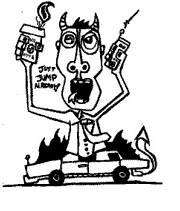AT LAST. A national news story that makes Seattle look awful, and Paul Schell has nothing to do with it.
A woman’s private torment became a city’s Rorschach test last week when, after hours of indecision, she jumped from I-5’s ship canal bridge. Fortunately, she lived. Unfortunately, so did the story—which circled the globe—that while she teetered on the edge, trying to decide whether to live, countless angry, frustrated commuters bombarded her with obscenity-laden demands that she die.
That was the story. But the real story, globally and especially in Seattle, was the media’s handling of the story. Most local media outlets reminded us of how sensitive and respectful they were to the woman and her loved ones—which wasn’t especially true, but it’s also not the point. The problems were quite a bit more serious, and evident throughout the story’s arc. Locally, that arc had three distinct phases. During and after the woman’s tense standoff, most of the coverage focused on the closure of I-5 and on the mass inconvenience—not that a person’s life was in the balance.
Then, when police announced that they’d closed down the freeway partially due to the taunting of passersby, the story went ballistic. But was it a story? The impression left by most media coverage was that the taunting was nonstop. But in an interview the following afternoon on NPR’s All Things Considered, SPD spokesperson Clem Benton acknowledged, in response to a direct question, that the jeers occurred only “four or five” times—still appalling, but over the course of almost four hours, or even the first 40 minutes, hardly a barrage.
The distinction is important. Even if dozens of people urged the woman to jump, that’s neither unusual for a public suicide nor an insight into Seattle’s (or urban America’s) alienation. Yet that was the whole point of the story: how awful people have become, a thesis far too many of us are willing to believe at the drop of a hat.
OBSESSIVE NAVEL GAZING
Here in Seattle, it also fed into this city’s tendency to obsessively navel-gaze. Somehow, every major local story—WTO, dot-com failures, Mardi Gras, Boeing’s fleeing executives, a woman urged to jump—has to become an insight into Seattle’s soul or state or psychosis or some such pop-psychology nonsense. Our four-county metropolitan area has over three million people in it; characterizing us all on the basis of 20 (or four) assholes is preposterous.
Which leads us to the local media’s phase three: the thumb-sucking, feel-good “We really ARE okay! We really DO care!” stories that are equally inevitable, and equally inaccurate. We don’t care. Few people want anyone to die unnecessarily, but as individuals, we all have our own lives to lead and rarely reach out to strangers; societally, our lack of support, services, or understanding for people suffering from mental health crises or illnesses (along with most other people on society’s margins) is scandalous. For Christ’s sake—one of Seattle’s leading mayoral candidates, Mark Sidran, built his career bashing and criminalizing people who often have mental health problems. Hello?
That—not isolated road rage—is the lack of civility in this story, and it was entirely ignored. In the end, what we cared about in the story was that it was about us, not her.
It’s easy to say that our willingness to first believe the worst about ourselves, and then rush to refute it, is a function of all the bad hits Seattle has taken in the Schell era. But for all the talk last week that our cruel taunting shows that Seattle is a big city (duh . . .), the media response shows that at heart, Seattle’s civic culture is still small town—continually obsessed with our image and how others view us. It was ever thus; WTO would never have happened had civic leaders not been in a decades-long frenzy to host major sporting and trade events as proof, somehow, that we’re a “world-class city.”
World-class cities aren’t defined by a few rude motorists. And in a story where just about every news outlet in the city fed us self-congratulatory pap about how ethically aware they were, few cared about the ethics of spending days first encouraging us to believe the worst about ourselves, then reassuring us that we really are wonderful after all, when neither conclusion followed from what actually happened. A few people handle broken relationships badly; a few people handle traffic jams badly. The rest of the story was pure invention.







